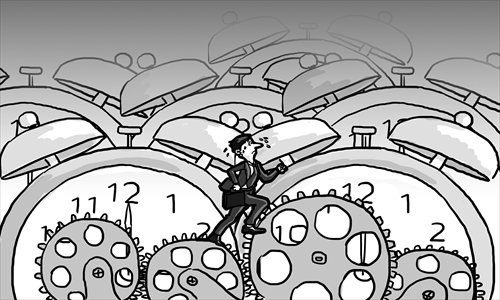Time’s arrow flying too fast for ordinary people to keep track

This is the season when I feel time is truly flying by. The New Year still feels like yesterday and the fourth quarter has yet started. But this year already feels like it is over.
I hope this is only my own sad perception. But just look at the bustling world around us. The magazines we get today have a publication date at least a week later. The food we buy in the supermarkets sometimes has a use by date expiring tomorrow.
At the end of August, Halloween decorations are on display in the shops. In mid-September, brand manufacturers start to launch previews of Christmas gifts.
Many people are still thinking of updating their wardrobes for the upcoming autumn. The fashion shows are sporting collections for next spring. The presidential election is still weeks away, and yet the media has started to speculate about who the candidates will be in 2016.
In my own household, toothpaste, razor blades and soap are stocked for at least the next year, and dine out lunches and dinners have been booked until the end of the year. That's all thanks to sophisticated marketing people who keep sending us discount coupons and my "never ignored a so-called bargain" husband.
The most extreme pre-planning story I heard is from a Manhattan real estate broker. He had a Chinese client who came to New York to do house hunting for her daughter.
"She said she wanted an apartment close to Columbia University because most likely her daughter will be studying there. I asked her how old the daughter is. She said two. Can you believe it?" the broker said.
Blame the commercialism, the sharp competition or our own restless nature, we are now in a world where everyone is forced to live, think and consume ahead of time, a world where everyone tries to get far ahead, a world that has no present, only the future.
To the economy, this is both bad and good news.
Americans' deeply rooted habit of spending now what you cannot afford to pay back tomorrow helped to cause the financial crisis, especially when that spending was on McMansions.
Once the crisis hit, everyone was pinching pennies and credit was tight. It was also scary: Without people consuming the future, the economy quickly sank.
But to ourselves, the addiction to the future is nothing to be celebrated. When we mark our calendars at the dinner table, on the subway train or in bed with future appointments, when we spend our time trying to figure out how the next generation of iPhones will look like, and when we press our kids for what they want to do in the future and force them to run towards it, our life becomes some dots extending forward. And the lines between the dots, the present itself, become vague and obsolete.
In this world, the only thing that matters is what will happen. Anything that is happening right now loses weight.
That's maybe why when lands are seized by aggressive developers and residents are displaced, or when machines are invented and drive people out of jobs, we often see cold mercilessness rather than sympathy.
After all, few would question that the present should yield to the future.
We have all become slaves of the future, trapped in a time machine with only a one way ticket. Shakespeare said "We know what we are, but we know not what we may become." That sounds like a golden era compare to now when we all have a clear idea of what we may become, but we no longer know what we are.
That may be able to explain the rapidly increasing popularity of yoga, meditation or other similar practices. We hope they can drag us back to the present.
But to many participants, the effect, although detectable, is also frustratingly short-lived, like an aspirin to deal with cancer. What we need are some fundamental changes.
Some wise people, economists, philosophers, and writers, are working on it.
They call for productivity reduction, a four-day work week, and a slowdown in the pace of life so we can all have dinner with our families all the time.
These ideas may work and they gained quite a lot of fans during the financial crisis. But they are being forgotten now with the economy picking up a little bit.
Maybe the only time we are able to concentrate on the present is the hard times when we feel there is no future.
The author is a New York-based journalist. rong_xiaoqing@hotmail.com